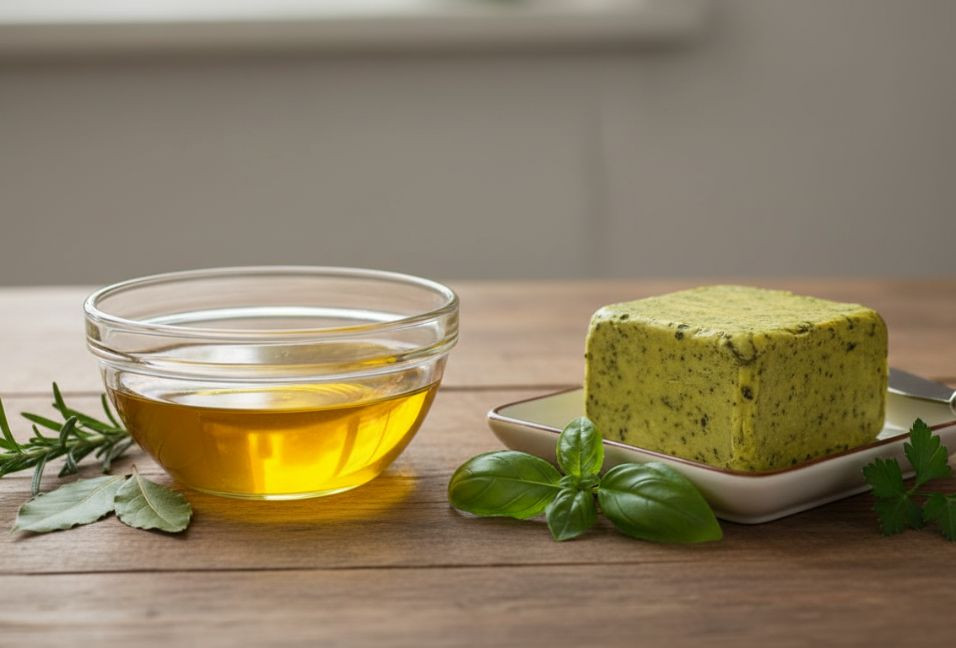THC Cooking Oil vs. Cannabutter: Which is Best for Your Cooking Needs?
Cooking with cannabis has come a long way. You’re no longer stuck with just one way to infuse your food, now it’s all about finding what works for your recipe, your kitchen habits, and your dietary needs. Two of the most popular options are THC cooking oil and cannabutter.
Both are great for infusing THC into everyday meals, but they have some key differences that matter when you're whipping up dinner or prepping a batch of brownies. We’ll compare the two across flavor, flexibility, storage, and more so you can decide what fits your cooking style best.
What Is THC Cooking Oil?
THC cooking oil is a plant-infused oil that’s used to add cannabinoids to food. It’s made by combining a high-fat oil with hemp flower that’s been decarboxylated. The result is a versatile, shelf-stable ingredient you can use across recipes, without needing dairy or refrigeration.
You’ll usually find THC cooking oil made with:
- Coconut oil: Rich in fat, great absorption
- Olive oil: Kitchen staple, neutral flavor
- Avocado oil: Heat-friendly and mild
Here’s how it works. Once the raw hemp flower is decarboxylated (heated to activate cannabinoids), it’s infused into oil at a low temperature. This process helps the oil absorb active compounds efficiently. The longer and lower the heat, the better the infusion typically performs.
And no, you don’t need a lab setup to get it right. While some folks make it at home, there are also reliable, ready-to-use options like our Green Queen Potency Booster Herbal Infusion Oil, a solid pick for everyday kitchen use.
Why people go for THC cooking oil:
- No dairy: Perfect if you want something plant-based
- Longer shelf life: Can last months with proper storage
- Easy to dose: Measured use is more consistent than guessing
- Great for savory dishes: From salad dressings to sautés
It also works well for recipes that require higher heat, making it a flexible choice for everyday meals. For those who want more control without the butter factor, it’s a go-to. You can also explore options like Green Queen Delta-8 THC Infused Cooking Oil, which comes ready to use without the prep time.
What Is Cannabutter?
Cannabutter is butter that’s been infused with hemp flower, making it a go-to base for baked edibles. It’s been around long before infused oils showed up in sleek bottles. If you’ve had a homemade brownie at a friend’s place, chances are it was made with cannabutter.
Here’s how it works: you take butter (usually unsalted), heat it low and slow with decarboxylated hemp flower, then strain it. That’s the short version. There are a few more steps if you’re doing it from scratch, like prepping your flower, using a double boiler, and figuring out how strong you want the batch to be.
Here’s what makes cannabutter different from THC oil:
- Flavor: Butter’s rich. It brings more flavor to the table, especially in baked goods.
- Texture: Great for anything that needs to be creamed, like cookie dough or cake batter.
- Tradition: It’s the classic choice for brownies, cookies, and bars.
- Storage: Needs refrigeration or freezing. It doesn’t last long at room temp.
Cannabutter has been part of the edible world, Especially when you want a recipe where the flavor of butter matters. Think fudge, shortbread, or anything that gets better with a creamy texture.
That said, if you're dairy-free or looking for something easier to store, it might not be the most practical option.
How Does THC Cooking Oil Compare to Cannabutter?
Both THC cooking oil and cannabutter are used for infusion, but they serve different needs in the kitchen. Oil is flexible, shelf-stable, and works great for everyday cooking. Butter brings richer flavor and texture, especially when baking’s the goal.
To help you figure out which one works for your setup, here’s a quick comparison that skips the fluff.
|
Feature |
THC Cooking Oil |
Cannabutter |
|
Flavor |
Neutral or mild (depends on oil used) |
Creamy, rich, and buttery |
|
Dietary Needs |
Plant-based, lactose-free |
Not vegan-friendly; contains dairy |
|
Versatility |
Works for sautéing, dressings, sauces, and baking |
Best in baked goods where butter texture matters |
|
Storage |
Pantry-safe if sealed; lasts 1 to 2 months |
Needs refrigeration; short shelf life |
|
Heat Tolerance |
Handles medium-high heat well |
Not ideal for high-heat recipes |
|
Prep Time |
Shorter if using ready-made options |
More steps, cleanup, and planning |
|
Consistency Control |
Easy to mix evenly into recipes |
Can be harder to blend evenly |
|
Infusion Efficiency |
Absorbs cannabinoids well in fat-rich oils |
Effective but more sensitive to temp and time |
When Should You Use THC Cooking Oil?
THC cooking oil is your go-to when you're working with savory recipes or anything that needs heat. It blends well into sauces, sautés, dressings, and even quick snacks that don’t need baking.
- Salad dressings: It mixes evenly with vinegar and herbs
- Sautéed vegetables: Handles medium heat without breaking down
- Pasta dishes: Works as a finishing oil or base in sauces
- Grain bowls and roasted veggies: Adds subtle richness without overpowering the other flavors
- Quick marinades: Great for tossing with tofu, mushrooms, or other plant-based proteins
What makes it even more practical is that you don’t have to refrigerate it right away. Most oils (like MCT, olive, or avocado) stay fresh in the pantry if kept in a cool spot, sealed tight.
Also, this matters more than people admit: cleanup’s easier. No scraping butter residue from a mixing bowl or trying to remelt a cold chunk. Just pour, mix, and move on. Especially useful if you’re working with limited kitchen tools or you’re just not in the mood to fuss with multiple steps.
When Should You Use Cannabutter?
Cannabutter is best when butter is a core ingredient in the recipe, not just an add-on. If you’re baking cookies, brownies, or anything where butter gives the dish its structure and taste, cannabutter is probably your move.
Recipes where cannabutter actually shines:
- Brownies: Classic. It gives them that dense, fudgy texture.
- Cookies: Helps dough hold together and adds richness.
- Banana bread or muffins: If you're after moisture and flavor.
- Frostings or fillings: Where the butter base matters for consistency.
- Rice crispy treats: Old-school, but still works like a charm.
But here's what you’ve gotta keep in mind: cannabutter isn’t a one-size-fits-all thing. It melts fast, doesn’t love high heat, and absolutely needs to be refrigerated. If you're prepping ahead, freezing portions can help, just wrap them well and label the heck out of everything.
And if you're not into making it from scratch or want more control over the infusion part, something like the Delta 8 Pro D8 THC-Infused Hemp Flower lets you build your own batch without guessing what’s in it.
THC Cooking Oil vs. Cannabutter: Which Should You Choose?
There’s no one-size-fits-all answer, but there’s definitely a right pick for your recipe. You’ll wanna think about what you’re cooking, how much effort you’re putting in, and whether butter actually belongs in the dish.
So let’s get to the good part: making the call. This breakdown helps:
Quick Decision Guide
- You’re vegan or dairy-sensitive? THC cooking oil is your friend.
- You’re baking cookies or brownies? Cannabutter wins. It’s built for this stuff.
- You’re making dressings, sautés, or anything savory? Stick with oil. No second guessing.
- You hate having to refrigerate everything? Go for oil. It lives on the shelf and won’t spoil quickly.
- You’re into precise dosing and less mess? Oil tends to be easier to measure and clean up.
Still unsure? Here’s how we usually frame it when someone messages us with “but I kinda want both…”
If you’re just starting out, pick one based on how you cook most often. If it’s more baking, grab butter. If it’s more weekday meals and sauces, go oil.
So, Which One Belongs in Your Kitchen?
There’s no universal “winner” between THC cooking oil and cannabutter, it really depends on how you cook. If you’re more of a stove-top type who tosses things together on the fly, oil’s going to feel easier. But if you live for weekend baking sessions or swear by handwritten family recipes, cannabutter might be more your speed.
THC Cooking Oil works better for everyday meals, no-bake snacks, and plant-based diets. It’s easier to store and clean up after. You can browse more cannabinoid oil options here. Cannabutter shines when the recipe depends on butter for structure and taste. Think gooey cookies, chewy bars, or homemade frostings.
And if you're looking for trusted products to get started, we've got your back. The Calm Leaf curates a variety of infused oils and hemp products that make cooking with cannabinoids less of a guessing game. Whether you're browsing our Delta-8 selection or just exploring everything we offer, you're covered with lab-tested options that are built for consistency.
Frequently Asked Questions
What is THC cooking oil used for in recipes?
THC cooking oil is used to add cannabinoids to food, without changing the texture too much. It works in a ton of recipes, from pasta dishes to salad dressings. People like it because it blends smoothly, especially when butter isn't the right fit. You can also use it to replace standard oils in most recipes, as long as the heat level isn’t too extreme.
Can I use THC cooking oil instead of butter in baked goods?
You can, but it depends on the recipe. In things like muffins or banana bread, THC oil works fine. But if you're baking something that relies on the solid structure of butter, like sugar cookies or shortbread, it might not give you the texture you're expecting.
How do I store THC cooking oil to keep it fresh?
Keep it in a cool, dark place, think pantry or cupboard. As long as the lid’s tight and the bottle stays away from heat and sunlight, it should hold up for a few months. If you made it yourself with fresh flower, storing it in the fridge may give it a longer shelf life, but it could thicken up a bit depending on the oil you used.
Is THC cooking oil vegan-friendly?
Yes, as long as the base oil is plant-based, like coconut, olive, or avocado, it’s a good choice for vegan or dairy-free diets. You’ll still want to double-check the product label if you're buying something premade.
What’s the difference between infused cooking oil and just adding hemp flower to a dish?
Infused oil has already gone through decarboxylation and extraction, meaning the cannabinoids are ready to interact with your recipe. Just tossing raw flower into a dish doesn’t do much unless it’s been activated by heat, and even then, the texture might be gritty or unpleasant. Using properly infused oil is more reliable, more consistent, and a lot more enjoyable.
Can I use THC oil in cold recipes like dips or smoothies?
Absolutely, just be sure it’s the right kind of oil. MCT or olive oil will stay liquid at cooler temps and mix in easier. We’ve seen people use a few drops in cold dips or homemade dressings. It won’t change the texture, and it’s a good way to keep things low-key if you’re not cooking with heat that day.
Is it safe to heat THC oil in a frying pan?
You can cook with it, yes, but keep the heat moderate. Most oils used for infusion (like olive or coconut) can handle medium heat. Just don’t crank it to high or leave it smoking. If the pan’s too hot, you risk degrading the cannabinoids. If you're unsure, we recommend adding the oil toward the end of cooking or using it as a finishing drizzle.
How much THC oil should I use in cooking?
That depends on the concentration of the oil and how many servings you’re making. We can’t give dosage advice, but here’s a tip: start with small batches, especially if you're trying something new.
Can I use THC oil to meal prep for the week?
Definitely. We’ve had users mix it into bulk salad dressings or pasta sauces and store them in glass jars. Just be mindful of how long it’ll be sitting, infused oils can go bad if left open or exposed to heat. Keep everything sealed and stored properly, and you should be good.
Where can I find reliable THC cooking oil online?
Right here. At The Calm Leaf, we carry infused cooking oils made with tested, high-quality ingredients. Whether you're looking for Delta 8 options or other cannabinoids, every product we stock goes through third-party testing, and lab results are always available on-site. That way, you know exactly what you're working with.
Recent Posts
-
The Next Psychoactive Combination: Live Resin & Mushroom Blends
Standing on the precipice of a brand-new era in botanical exploration, the modern enthusiast is witn …Feb 06, 2026 -
7 Mistakes to Avoid When Using Amanita Muscaria Powder
The forest floor has always held secrets that captivate the human imagination, but few natural speci …Feb 04, 2026 -
How to Properly Keep Your Pet Calm When They’re Traveling with You
For virtually all pet owners, we spend almost all of our time with our furry friends at home. This d …Feb 03, 2026



